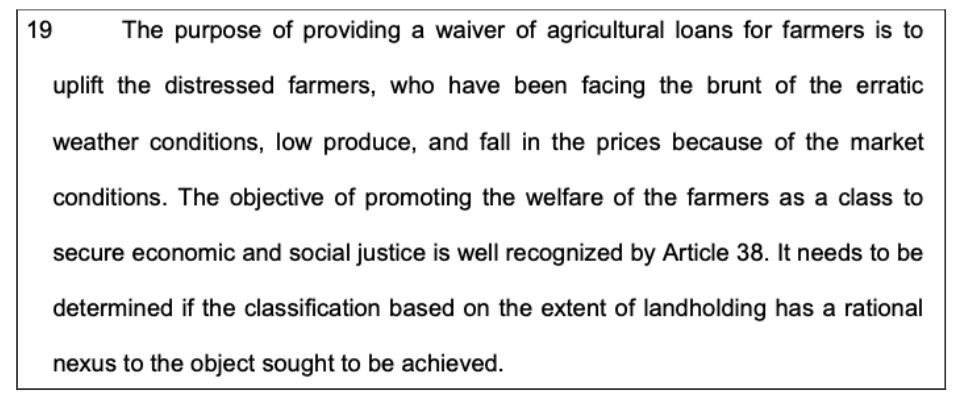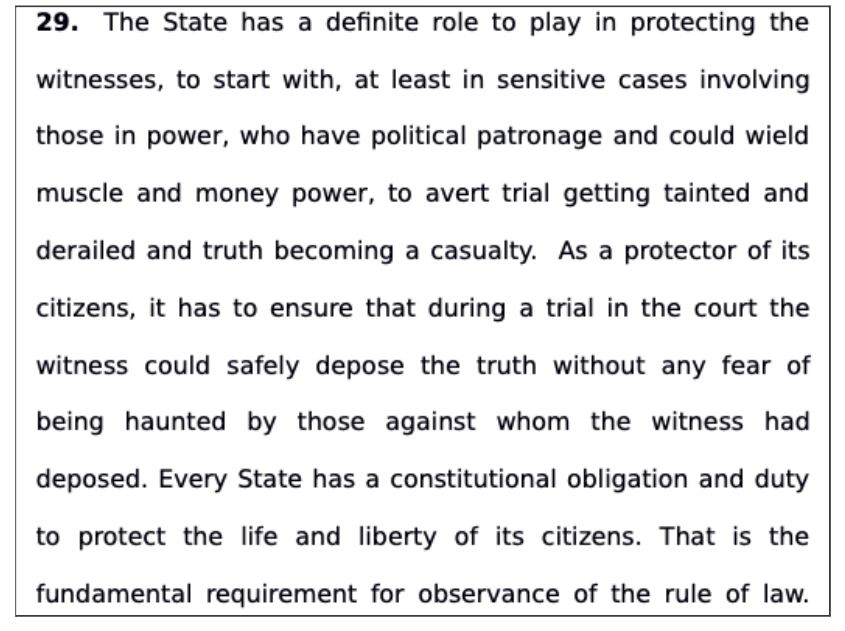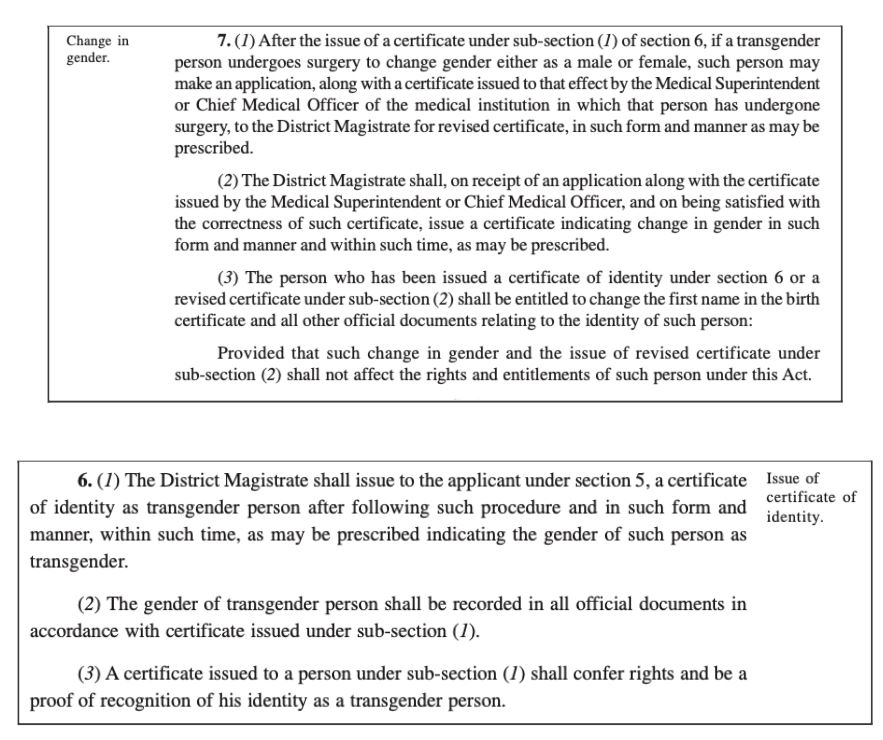In this roundup of court judgements, we look at Constitutional Courts’ remarks & directions about TN’s Loan Waiver Scheme for small/marginal farmers, protection of witnesses, rights of transgender persons, and social impact of heinous crimes.
Supreme Court: Upholds TN Govt Loan Waiver Scheme to small/marginal farmers
In the case State of Tamil Nadu vs. National South Indian River Interlinking Agriculturist Association, the Supreme Court held that the ‘Loan Waiver Scheme’ for small and marginal farmers cannot be held to be constitutionally suspect merely because it was based on an electoral promise.
The apex court was hearing a challenge to the Tamil Nadu Government’s scheme (dated 13 May 2016) granting a waiver of outstanding crop loans, medium-term (agriculture) loans and long term (farm sector) loans issued to small and marginal farmers. The scheme was being challenged on the ground that it violates the equality clause of the Constitution. The scheme guidelines provide for the classification of farmers as small and marginal, as per the extent of landholding mentioned in the landholding register and loan register at the time of sanction of the agricultural loan. A ‘small farmer’ means a farmer who holds land of 2.5 acres to 5 acres and a ‘marginal farmer’ means a farmer who holds land up to 2.5 acres.
Additionally, the All India Anna Dravida Munnetra Kazhagam (AIADMK) had made an electoral promise to implement the scheme if voted to power. In pursuance of the election promise, the AIADMK introduced the scheme after being voted to power.
The Madras High Court allowed the writ petitions and held that the exclusion of ‘other farmers’ (with land exceeding 5 acres) from the land waiver scheme is discriminatory and violative of Article 14. The high court also directed that the scheme be extended to all farmers including farmers whose landholding exceeds 5 acres.
Taking into account the Situation Assessment of Agricultural Households and Land and Holdings of Households in Rural India 2019, the bench of Justice DY Chandrachud and AS Bopanna noted that due to the distinct degree of harm suffered by the small and marginal farmers as compared to other farmers, it is justifiable that the benefit of the scheme is only provided to a specified class as small and marginal farmers constitute a class in themselves.
The purpose of the scheme is to uplift the distressed farmers, who have been facing the brunt of the erratic weather conditions, low produce, and fall in prices because of the market condition.
The Supreme Court held that it is settled law that the Court cannot interfere with the soundness and wisdom of a policy merely because it was based on an electoral promise. A policy is subject to judicial review on the limited grounds of compliance with the fundamental rights and other provisions of the Constitution. A scheme can be held suspect only within the contours of the Constitution, irrespective of the intent with which the scheme was introduced.

The bench observed that since the classification in the scheme is based neither on the grounds in Article 15 (i.e. religion, race, caste, sex, place of birth) nor on the ‘innate and core trait’ of an individual, it cannot be struck down on the alleged grounds of under-inclusiveness and over-inclusiveness.
Supreme Court: Fundamental right of witnesses to testify in Courts without pressure & threat under serious attack today.
In the case Hari vs. State of Uttar Pradesh, the Supreme Court observed that the right of witnesses to testify in Courts in a free and fair manner without any pressure and threat whatsoever is under serious attack today.
The apex court was hearing a case of honour killing. In this case, the Trial Court had sentenced some of the accused to death and later the High Court commuted the death sentence to life imprisonment. A total of 54 persons were accused under Sections 302/149 of the Indian Penal Code (IPC). On 09 April 1992, evidence from one of the eyewitnesses was initially recorded, where she narrated the sequence of events and the involvement of the accused in the crime. During the trial, applications were filed for consolidation of the cases in which the High Court stayed the trial in 1992 which subsisted till 1998.
On 21 February 1998, when the eyewitness was recalled to depose in Trial Court, she turned hostile. Later, she was declared hostile along with 11 other prosecution witnesses. When the trial resumed in 1998, 12 out of the 20 prosecution witnesses turned hostile.
Upon examining the situation, the bench of Justice L. Nageswara Rao, Sanjiv Khanna and BR Gavai emphasised that one of the main reasons for witnesses to turn hostile is that they are not accorded appropriate protection by the State. It is a harsh reality, particularly, in those cases where the accused persons/criminals terrorise or intimidate the witnesses because of which these witnesses either avoid coming to Courts or refrain from deposing truthfully. This unfortunate situation prevails because the State has not undertaken any protective measures to ensure the safety of these witnesses, commonly known as “witness protection”.
In this case, the bench noted that the reasons for the witness turning hostile are understandable as she comes from a lower stratum of the society, living in a village dominated by the caste to which the accused persons belong. Further, the bench opined that the evidence of prosecution witnesses cannot be rejected in toto merely because the prosecution chose to treat them as hostile and cross-examined them.

In the light of other evidence on record (medical, scientific, and documentary evidence) along with the accounts of other witnesses, even if the witnesses have turned hostile, their evidence can be accepted, if they are natural and independent witnesses and have no reason to falsely implicate the accused.
In the present case, the evidence of the abovementioned witness finds complete corroboration from the evidence of other witnesses who are also reliable eyewitnesses of the incident.
In conclusion, the Supreme Court held that the testimonies of the eyewitnesses are credible and have been rightly accepted by the Courts. In addition, the judgement emphasises that the right to testify in Courts in a free and fair manner without any pressure and threat whatsoever is under serious attack today. If one is unable to testify in Courts due to threats or other pressures, then it is a clear violation of Article 19 (1) (a) and Article 21 of the Constitution. Right to life guaranteed to the people of this country also includes in its fold the right to live in a society that is free from crime and fear and the right of witnesses to testify in Courts without fear or pressure.
Allahabad HC: Directs name, gender change of a transgender person in educational records following UP Education Board’s denial.
The Allahabad High Court (Lucknow Bench) directed the Uttar Pradesh Government authorities to take immediate steps for change of name and gender of a Transgender in her educational mark-sheets and certificates.
In this case, the petitioner approached the High Court seeking directions to the Board of High School and Intermediate Education, Allahabad (U.P. Board) to change the name and gender of the petitioner in her matriculation mark-sheet. Thereafter, Council for the Indian School Certificate Examination, New Delhi (ICSE Board) may also change the name and gender in the mark-sheet of intermediate of the petitioner.
The petitioner was suffering from gender dysphoria and, therefore, underwent gender reassignment surgery in October 2017 from male to female. A gazette notification in respect of her name change from ‘X’ to ‘Y’ and gender from ‘male’ to ‘female’ was also published. The petitioner also got an Aadhar, and PAN Card issued in her new name and gender i.e., Y female.
The petitioner also applied for the change in her High School mark-sheet and certificates, however, the same was denied. The Examination Committee decided that changes of name and gender as requested by the petitioner cannot be made as either the Intermediate Education Act, 1921 or regulations framed thereunder contain any such provision.
In a different stance, the State Counsel argued that with regard to change of gender, the certificate can only be issued under Section 7 of The Transgender Persons (Protection of Rights) Act 2019 (read Section 7, clause 3) to a person who is having a certificate under Section 6 of the Act.

Section 6 of the Act states that the District Magistrate shall issue a certificate of identity as a transgender person to the applicant under section 5, and the said certificate shall confer rights and be proof of recognition of their identity as a transgender person.
In this backdrop, the State Counsel argued that since the petitioner did not have a certificate under Section 6 (Issue of certificate of identity) and had changed his gender before coming into the force of the Act, the petitioner is not entitled to apply under Section 7 (Change in gender) of the Act.
The Bench of Justice Vivek Chaudhary stressed that the Act cannot be given an interpretation that would defeat the very purpose of the Act, which is to promote equality and respect for transgender persons.
In conclusion, the petitioner has now been permitted to apply under Section 7 of The Transgender Persons (Protection of Rights) Act 2019 before the District Magistrate. The District Magistrate will ascertain the facts of the gender re-assignment and issue the required certificate to the petitioner within 60 days. Based on this certificate issued by the District Magistrate, the petitioner can approach the authorities concerned for changing her educational records and issue her fresh changed mark sheets and certificates.
Karnataka HC: In the heinous offence of rape, proceedings cannot be quashed even if parties have reached a settlement.
In the case Anil S/o Venkappa Kushalkar vs. the State of Karnataka, the Karnataka high court has held that in a case of a heinous offence of rape, even if the parties have settled the dispute, the same cannot be accepted and the proceedings cannot be quashed since it will have a serious impact on the society.
The high court was hearing the petitioners seeking to quash proceedings pending before the Additional Sessions Judge, Vijayapur, under Sections 366 and 376 of IPC and Sections 12, 5(L), 5(J)(II) and 6 of the Protection of Children from Sexual Offences Act (POSCO), 2012.
In the present case, as per the police complaint lodged in 2019, the accused Anil Khushalkar had committed rape on a minor girl, who later became pregnant. Thereafter, he kidnapped the victim and took her to Kolhapur.
The Counsel for the Petitioners submitted that the accused and victim have married, and they have a child. The victim was examined before the Court, but she did not support the prosecution’s case. It was argued that the victim has turned hostile, and no purpose would be served in continuing the proceedings against the accused.
Further, the Counsel for petitioners has deposed before the Trial Court that she was aged 19 years at the time of the incident.
The bench of Justice HP Sandesh held that whether she was minor or major has to be adjudicated before the trial Court. The bench observed that due regard has to be given to the nature and gravity of the crime and its social impact. Therefore, the matter requires to be tried before the Trial Court as the accused has committed offence of rape against a minor girl which attracts the provisions of IPC and POCSO Act.
In conclusion, the petition was dismissed, directing the Trial Court not to be influenced by the observations made by the high court while passing the order.
Featured Image: Important Court Decisions


